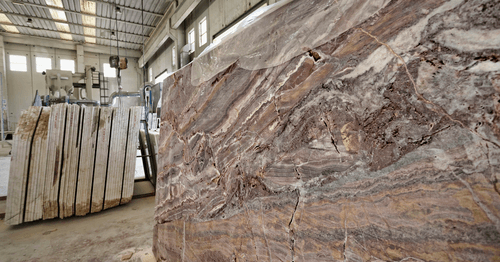Will bacteria grow on granite?
Bacteria, like any other living organism, needs something to eat in order to live. Like other natural stone, granite is porous. Any type of countertop, improperly sealed and sanitized, may harbor bacteria. Unclean countertops can harbor bacteria regardless of what material is used. Granite has performed extremely well in testing; performing second only to stainless steel, in its ability to resist bacterial growth.
Is granite a natural stone or is it man-made?
Granite is a natural product. Granite is quarried in its natural form directly from the earth and is cut and processed by machine. Because of its extreme hardness and mineral content, granite can be polished to a mirror-like finish using proper machinery.
What does "honed" granite mean?
Honed granite is granite that has not been polished to a shine. It is a smooth, matte finish. Honed granite is lighter in color than its polished counterpart; however the color can be deepened with a color-enhancing sealer.
What is tumbled marble?
Tumbled marble is quite literally, marble that has been loaded into a tumbler and knocked against each other in order to achieve rough, worn edges and surface. Some materials that are referred to as "tumbled marble" are actually tumbled limestone or travertine, the process is the same and aesthetically they are difficult to tell apart.
Are veins weak spots in the stone?
Not necessarily. Some veins are strictly color variations in the stone. However in some materials natural flaws can exist within the vein, which enhances the color and is characteristic of that stone. Structurally, with today's processing, these materials do meet the strength requirements for countertop use.
Why do some stones have a mesh backing?
Mesh backing improves the stability of the stone for shipping and fabrication. Many exotic materials would otherwise not remain intact during processing. Once these materials are installed however, they do meet the strength requirements for countertop use.
What is the difference between "cast stone" and natural stone?
Cast stone is made up of finely ground stone mixed with resins or cement-based products, then poured into a mound to create either a slab of cast stone or to create sinks, mantels, etc. Natural stone is strictly cut from the earth then cut and polished in its original, natural form.
What is antiqued granite?
Instead of the normal process of polishing granite, the polishing bricks are replaced with an abrasive brush which leaves a satin textured finish.
Can you cut on granite or do you have to use a cutting board?
Yes, you can cut directly on granite. However, routinely cutting on a granite surface will dull your cutlery.
What is a "pit"? Will I have them in my countertops?
Most granite has some degree of pitting, whether microscopic or visible to the naked eye. With today's advanced processing, the natural pitting or tiny craters in a granite finish are greatly reduced. These natural pits pose no maintenance or wear issues. The depth of these pits is virtually immeasurable.
Can granite crack or chip?
Yes, granite can crack or chip. However this is usually caused by severe settling, excessive impact or abuse. Most minor cracks or chipping in natural stone can be repaired by a specialist in the stone renovation business or by a qualified fabricator.
What is the difference between sanded and unsanded grout?
Sanded grout is recommended for a joint width greater than 1/8". Use unsanded grout for joints 1/8" or less in width.
Are engineered quartz surfaces natural?
Marketers contend that quartz surfaces contain 93% quartz. However, this number is calculated by weight, not by volume. Therefore the true ratio of quartz is approx. 67 - 73%. It is also important to note "quartz" refers not only to natural quartz but glass and mirror particles as well.
Are there granite formations or quarries in the United States?
Yes, granite can be found across the US including Georgia, North Carolina, Maine, the Dakotas, California and New York just to name a few.
What is Soapstone and what kind of maintenance does it require?
Soapstone is quarried like Granite and Marble. Its primary components are magnetite, dolomite, chlorite, and talc. Talc in soapstone is soft to the touch, which gives the smooth feeling of rubbing a piece of dry soap. Thus the name was derived - "Soap" stone. For maintenance, mineral oil should be applied to the stone, which darkens the color and works as a protective sealing layer. The mineral oil will need to be re-applied to the stone periodically, especially when the counter tops are first installed. Over time, a patina will develop and the mineral oil can be applied less often. Soapstone will scratch. Scratches can be sanded out and re-sealed with mineral oil.
Are textured granites more porous?
No. Textured granites are created when the slabs are flamed and then brushed, machining the abrasive surface to a low sheen with an evenly textured finish. Though the granite has been enhanced through this process, the stone retains its superior durability over alternative countertop surfaces.
How long will my natural stone last?
Take care of your natural stone and it will last for generations. Some natural stones are as old as the earth.
What is patina?
A patina refers to the smooth surface appearance that is produced by the aging and use of natural stone over time.

